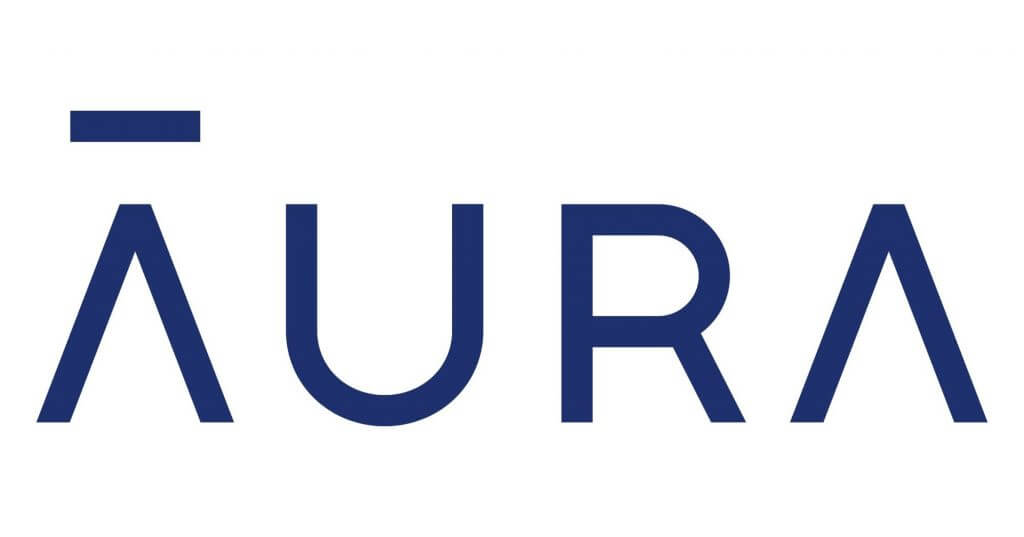Aura vs. LifeLock 2024: There’s A Clear Winner
After three months of testing Aura vs. LifeLock, I can safely say that Aura is the clear winner.
Aura was easier to set up and uncovered 15 more data breaches than LifeLock – which only found one. Aura also provides more identity theft insurance across all plans, not just top-tier options.
If you want the peace of mind that comes with comprehensive and accurate monitoring, plus a lower price point, Aura is the best choice.
And, when you use our discount code, you can lock in OFF for life instead of facing the increased renewal prices that come with LifeLock’s services.
- You want the best identity monitoring
- You want up to $5M identity theft insurance on Aura’s family plan.
- You value the 24/7/365 US-based customer care
- You want the most identity theft protection value for your buck
Call 1-888-818-2249
Home Security Heroes independently tests and reviews every product. We may earn a commission when you buy through our links. Read more here.
LifeLock has long been one of the top dogs on the market when it comes to identity theft protection, which means Aura has a lot to prove to users, despite its impressive pedigree as the successor of Identity Guard.
So, which is better – Aura or LifeLock?
Let’s dig deep into these two services, and see which one really comes out on top – the “top dog” or the new breed.
Aura and LifeLock Head-to-Head Comparison
Editor’s Ranking

Aura vs. LifeLock Video Comparison
Aura Overview
Aura markets itself as an “all-in-one safety solution,” offering better identity protection alongside a lengthy list of digital security tools and online privacy tools.
Rather than seeking out separate services for a VPN, antivirus software, and parental controls, Aura includes it all in one easy-to-use and exceptionally affordable package (even more affordable when you use our discount code).
Though it’s newer to the world of identity theft protection, Aura is certainly making a splash, with big-name brand ambassadors like Robert Downey Jr. and an abundance of glowing reviews.
After testing it myself, I agree with just about everyone else. Aura is the best identity protection service available compared to its alternatives. And given its recent history of feature updates, it seems like it will only continue improving as time goes on, adding more useful features to help keep you and your family safe online.
Aura Pros
- Comprehensive, accurate, and speedy monitoring services
- 24/7/365 U.S.-based, helpful, and compassionate customer service representatives
- $1 million per adult in insurance coverage standard
- Flexible family plans allow five adults and unlimited children
- Full suite of digital privacy features
- Amazing data broker removal service
- Incredible tools for parents and families, including safe gaming with anti-bullying
- Pricing doesn’t increase upon renewal
Aura Cons
- The interface could be better
- VPN and antivirus software could improve
LifeLock Overview
LifeLock is the biggest name in identity protection services and there’s no doubt you’ve heard of them before. They market on television, podcasts, and social media, their most infamous advertisement featured the CEO’s social security number.
Unfortunately, LifeLock’s services failed to protect their own CEO’s identity – it was stolen 13 times. LifeLock has also had to settle an FTC lawsuit for false marketing claims and they were victims of a data breach in 2022.
So, LifeLock doesn’t have the best track record as an identity protection provider, but that doesn’t necessarily mean you should disregard it.
LifeLock includes many of the same features Aura does, like antivirus software, a VPN, and parental controls, making it a rival worth considering when you’re looking for identity protection alongside online security. It helps you to identify signs of fraud and suspicious activity.
LifeLock Pros
- Very sleek user interface
- Comprehensive services
- Up to $3 million in insurance coverage with their top-tier plan
- Full suite of digital security features, including Norton antivirus and a solid VPN
- Includes Norton family parental controls
LifeLock Cons
- Poor customer service
- Inaccurate monitoring
- Lower-tier plans offer below-average insurance coverage
- Family plans are restricted to two adults and five children
- Data broker removal isn’t full service (unless you pay extra)
- Price increases upon renewal
- Sordid company history
Aura vs. LifeLock: In-Depth Feature Comparison
If LifeLock included far more, was way more accurate, or offered incredible threat resolution services, I might be willing to look past its ever-increasing price. But LifeLock doesn’t offer any of that. So, Aura offers better value without question.
Select a category below to see our test results or keep scrolling for more info.
Identity Monitoring | Credit Monitoring | Threat Resolution & Customer Service | Identity Theft Insurance | Cost | Family Plans | Ease of Use | Additional Services | Customer Ratings
Aura vs. LifeLock Identity Theft Monitoring
On the surface, both LifeLock and Aura offer similar levels of identity monitoring, which includes insanely comprehensive monitoring when you opt for their top-tier plans, including:
- Dark web and data breach monitoring
- Payday loan monitoring
- Social Security number monitoring
- Bank account monitoring
- Sex offender and criminal registry monitoring
- USPS address change monitoring
- Social media insights
- 401(k) and investment monitoring
- All three credit bureaus credit monitoring (but only on LifeLock’s most expensive plan)
- Home title monitoring (Aura includes auto title monitoring too!)
The question is, how well do Aura and LifeLock actually perform these monitoring services? In other words, how accurate, speedy, and actionable are they when it comes to any identity monitoring and suspicious activity?
And that’s where Aura comes out on top.
Let me explain…
Dark Web Monitoring Coverage

- Aura found 15 unique dark web alerts, the maximum in our test
- LifeLock only found 1 alert
- 5 minutes
- 24 hours
- Yes
- No
When I tested LifeLock, I got only one alert that my identity had been compromised on the dark web.
In comparison, Aura found 15 dark web alerts. That’s more than the vast majority of identity theft protection services I’ve tested, and it definitely beats LifeLock.
We noticed the same pattern when our researchers Lauren and Zach tested Aura and LifeLock for their dark web alerts.
So, I can say without a doubt, Aura is more accurate than LifeLock when it comes to identity monitoring.
Here are the results from our dark web monitoring tests:
Here’s what my dashboard looked like when Aura found all my dark web alerts:
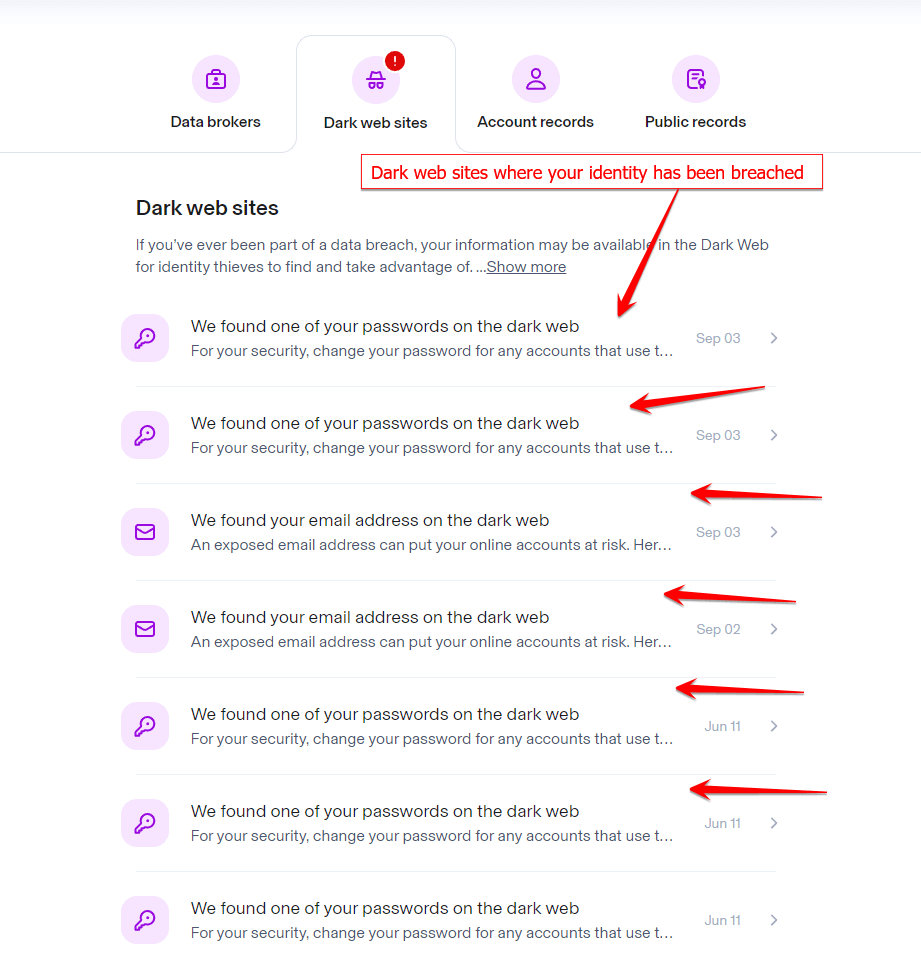
ID Theft Alert Speed
LifeLock is much slower in ID Theft Alert Speed. It took over 24 hours to find the single dark web alert it managed. Though it was faster with other Home Security Heroes testers, the overall picture is bleak.
It took Aura less than five minutes to run an initial scan of my personal information. Those 15 alerts populated right away, and over the course of testing, I found that additional alerts and notifications appeared in almost real-time.

One tester found it took three days to find (and begin monitoring for fraudulent activity) their home title. Home title information is a public record – it’s not like it’s hidden! But LifeLock’s mechanisms aren’t very fast.
That might not seem like a big deal, but it could be. If your information is leaked in a data breach, and you find out right away, simply changing your password could prevent a thief from identity fraud and wreaking havoc on your assets. The longer you wait, the more chances a criminal has to take advantage.
So, LifeLock’s speed (or lack thereof ) is a major red flag.
ID Theft Alert Actionability
Unfortunately, things don’t get much better for LifeLock when it comes to actionability. While Aura’s alerts include all of the key details, LifeLock’s don’t.
Take a look at a LifeLock alert:

So far, so good.
At this point, LifeLock looks very similar to Aura – it provides the compromised website and the date of the breach, and (though cropped out of this photo) it lists the information that was exposed.
Beneath this, it gives a list of steps you can take, which is also right in line with what Aura does.
But then, there’s a glaring issue.
Check out what LifeLock offers in terms of support…
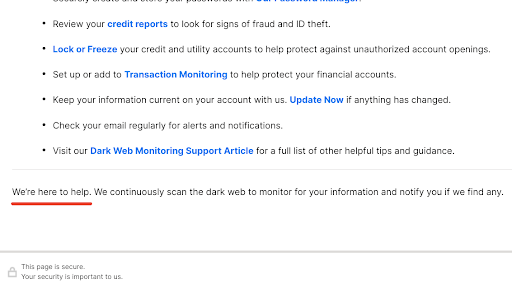
Notice anything missing?
LifeLock doesn’t include any access to their support team – no phone number, email, NOTHING. They just say they’re “here to help.”
You’ll notice lack of customer support is a consistent theme for LifeLock as this review goes on. And it’s a huge problem.
Though some alerts are easy to remedy yourself, there are others that require help. Aura provides its customer support phone number at the bottom of every alert. That means it’s easy to reach out if you’re confused or need help resolving a threat.
Credit Monitoring
Next, I want to touch on one more thing Aura and LifeLock have in common – convenient credit monitoring and financial tools.
Here, both LifeLock or Aura credit monitoring services are above average.
For both you get all three credit bureaus monitoring, credit reports and niche financial account monitoring (including 401(k) monitoring). All of that in itself is fantastic.
However, LifeLock only offers all of this with its top-tier plan - but with Aura, these credit reports are standard on every plan.

That is a huge difference.
Aura offers the best in class credit monitoring on EVERY plan, while you have to pay for the highest priced plan to get that same level of credit monitoring on LifeLock.
Aura gives you more bang for the buck.
Threat Resolution & Customer Services

- Aura’s knowdlegeable support experts answered my call within 1-2 minutes
- Support is terrible
- Yes
- Yes
- 24/7/365 Support
- 24/7
- Available on ALL plans
- None
- Yes
- Yes
An identity protection service’s ability to resolve threats and restore victim identities is a crucial aspect to consider when choosing between LifeLock and Aura.
Even the best identity monitoring can’t protect your reputation from every threat, and if/when you become a victim of identity theft, you want a service that will help you identify and resolve any fraudulent activity.
Even though LifeLock and Aura say they handle threats and identity restoration in the same way, my calls to their customer service teams uncovered major differences.
Though there are varying “identity restoration guarantees” and other promises services can offer, the biggest clue as to whether they can deliver top-notch threat resolution and identity restoration is in their ability to provide good customer service.
Let’s start with Aura.
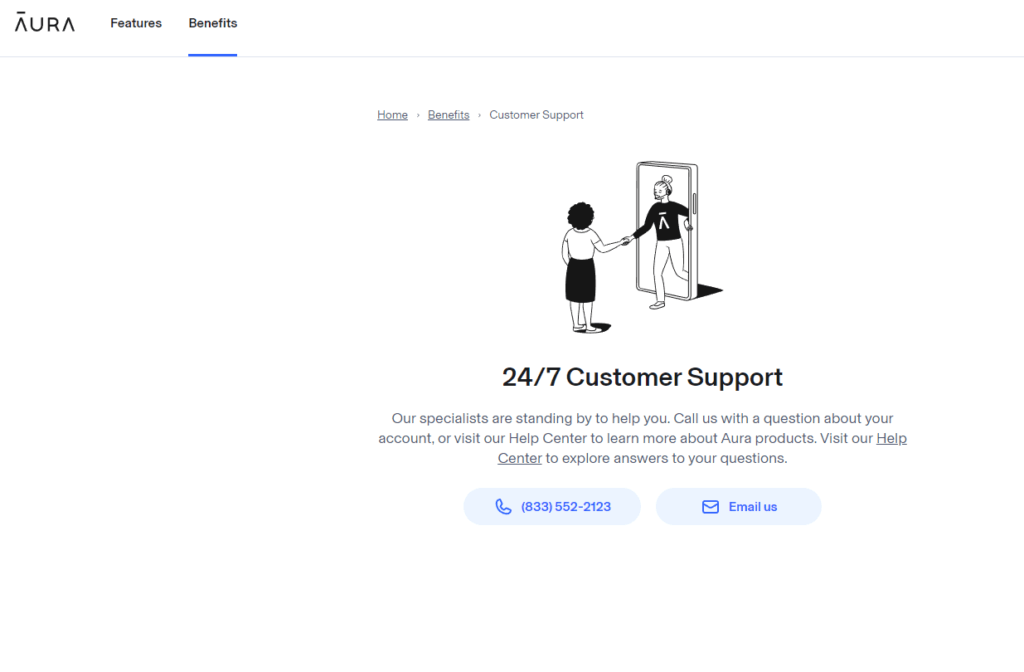
Aura provides 24/7/365 U.S.-based customer support. When I called them on a Saturday night, I was talking to a competent and friendly customer service representative within a minute. He was knowledgeable, eager to help, and clearly experienced when it came to addressing threats.
My experience with LifeLock was very different.
LifeLock splits their customer support into two teams – a specialized threat resolution team that’s U.S.-based and a 24/7 general customer support line that isn’t. Unfortunately, you have to call the general line and explain your issue before they connect you to the threat resolution team.
So, whether you have service questions or are dealing with a possible case of identity theft, you have to call general support first.
That’s a problem for a couple of reasons:
- LifeLock’s support phone number isn’t readily available. There’s a “SUPPORT” area of your identity protection dashboard, but it takes you to a series of self-help articles. You have to click through multiple prompts, each time stating “This didn’t answer my question.” before they’ll finally give you a number to call.
- LifeLock’s support team isn’t very knowledgeable. Once you get the number, you can expect to sit on hold for at least a few minutes – in my case, it was three minutes. Then I was connected to a support team member who gave vague answers. It felt like they were working off an ill-prepared script.
I wouldn’t want to call LifeLock if was I dealing with any sort of identity theft emergency given my experience. But I’d be happy to call Aura again, and I’d know I was in expert hands.
Lost Wallet Protection:
There is one other minor area of threat resolution that I’d be remiss not to mention – lost wallet protection.
Here, LifeLock and Aura promise almost the same thing. If you lose your wallet or find it’s been stolen, they’ll help you cancel and replace its contents.
However, when you read LifeLock’s insurance benefits they’ll actually go a step further than Aura…
With LifeLock’s insurance coverage, you can claim up to $500 in lost cash from a stolen wallet, purse, or handbag.
This isn’t something you see with most identity protection services, and it’s a nice feature. I‘m not sure it makes up for LifeLock’s lack of customer support, but I won’t withhold credit where it’s due!
Identity Theft Insurance

- Up to $5M on the family plan ($1M per adult)
- $1M per Adult on Individual & Couple plans
- Maximum $1M only on Advantage plan
This is where things get harder to judge.
In some ways, LifeLock’s insurance surpasses Aura’s, and in others, it’s weirdly below what I’d consider average.
To be clear, I consider average to be what most services offer: $1 million in aggregate coverage for stolen funds and expenses.
Often, this $1 million is static, regardless of the number of people on your plan. So if you have a couple’s plan or a family plan, you still get a flat $1 million in coverage.
Aura stands out by offering $1 million in identity theft insurance coverage per adult – and they allow five adults on a plan, which means $5 million in coverage.
LifeLock’s top-tier plan offers far more than Aura. It includes $1 million each in stolen funds, expense reimbursement, and legal fees per adult – giving each adult on the plan a whopping $3 million in insurance coverage.
But there’s a catch.
LifeLock’s mid and low-tier plans offer far less coverage, as low as $25,000 for stolen funds and expenses.
Now, they still market these plans as having $1 million in coverage, but that $1 million is exclusively for legal fees. I find this to be a little deceptive (which is par for the course with LifeLock).
Because Aura offers $1 million per adult WITH EVERY PLAN, it comes out ahead in this category. Yes, you can get more insurance coverage with LifeLock, but just wait until you see how much it costs!
Aura vs. LifeLock Cost & Pricing Compared
No contest here. Aura is one of the most affordable options on the market, while LifeLock is one of the most expensive among its alternatives.
Keep in mind the costs below are based on using our affiliate discount codes, so the prices will be higher on the respective service websites.
LifeLock versus Aura quick pricing comparison:
 | ||
Promo Code | ||
Individual Plan Cost |
|
|
Couple Plan Cost |
|
|
Family Plan Cost |
|
|
Renewal Price Increased After 1st Year? |
|
|
Promo Code |
The price difference here is staggering. To get an apples-to-apples comparison, let’s compare Aura’s pricing plan with the LifeLock Advantage subscription plan.
Aura’s Individual plan is about 50% cheaper.
Aura’s Couples plan is also 50% cheaper.
And Aura’s family plan?
35% cheaper than LifeLock, even though it includes up to five adults and unlimited children!
Here’s the kicker…
Aura’s price doesn’t change upon renewal, LifeLock’s does. That means LifeLock starts out as the pricier option and then continues to get more expensive as time goes on.
Family Plans
If you have a family to protect, Aura is the better choice.
LifeLock isn’t bad in this area – it’s one of the only services to offer identity theft insurance that increases with each child on the plan. But Aura offers so much more.
With an Aura family plan, you get:
- Parental Controls. LifeLock offers these too, but Aura’s have more usable tools, including the ability to pause the internet with one click.
- Safe gaming with anti-bullying. Aura is the only service to provide safe gaming for over 200 popular games. This feature uses AI and machine learning to monitor player interactions for signs of cyberbullying, harassment, and grooming.
- Digital privacy tools for families. This includes a family vault in which you can secure user data from devices like passwords and files you want to share with family and family only.
- Three credit bureaus child credit freezes. Request to freeze your child’s credit and help protect them from identity theft until they come of age using Aura’s credit freeze assistance.
- Geo-alerts for sex offenders. Parents will receive an alert if a sex offender moves within a one-mile radius of their current address so they can better protect their children.
- Flexibility. With Aura’s plans, you can include 5 adults and unlimited children on a family plan. This means you can protect your kids through college and beyond or protect your aging parents, siblings, and any other family you need to. LifeLock only allows two adults and five children on their family plans.
So, like I said, LifeLock isn’t bad when it comes to family plans – they just can’t compete with what Aura offers.
Ease of Use
I’m a big fan of LifeLock’s user interface, while I find Aura’s to be merely okay.
Take a look for yourself.
Here’s LifeLock’s dashboard:
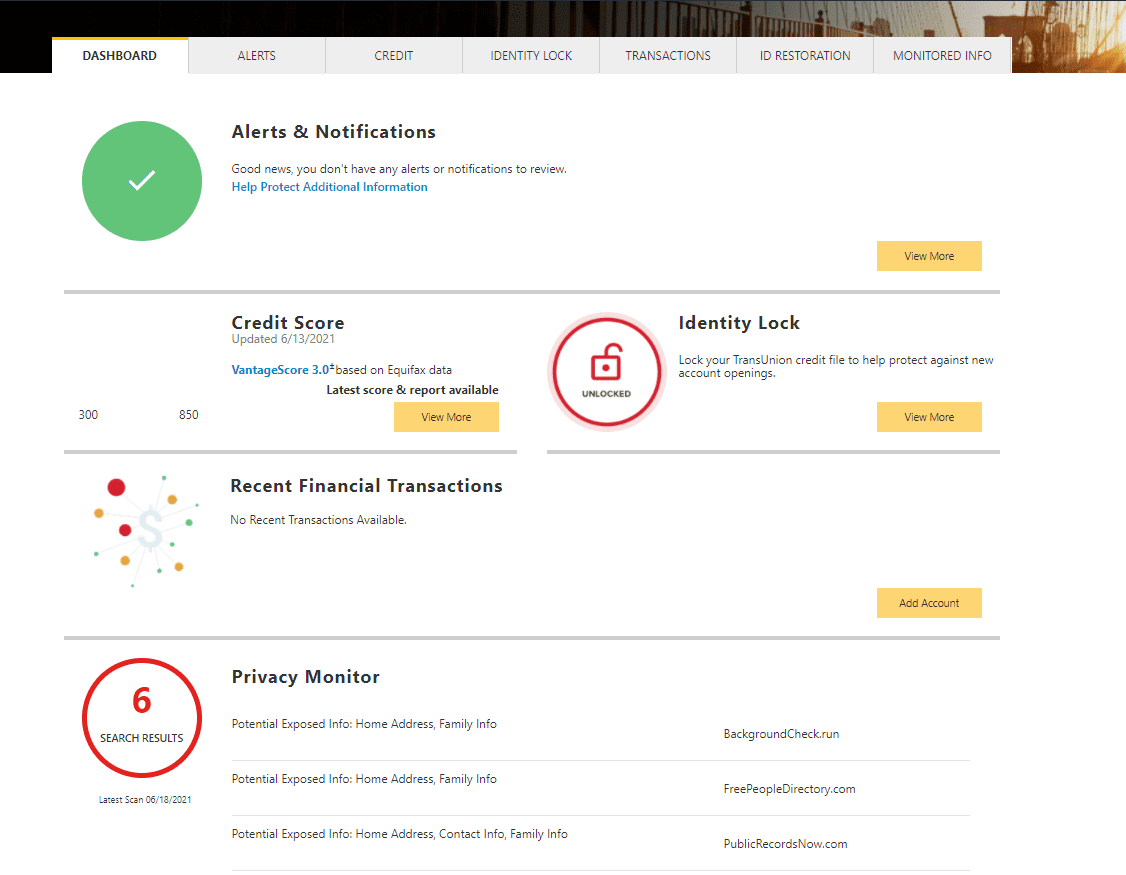
And here’s Aura’s:
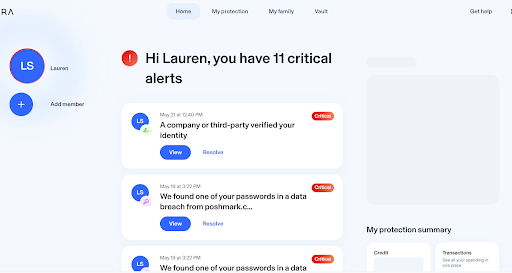
Neither one is bad by any means, but LifeLock’s makes more sense. It gives me exactly what I want to see in the order I want to see it – alerts up front, credit monitoring tools, and then credit reports recent transactions.
Aura offers alerts in a scrolling feed, followed by a second feed that features the service’s “activities.” So, if it contacts a data broker to remove your information, that notification shows up there. It reminds me of my Twitter feed, except far less interesting.
And, while infinite feeds work great for social media, they’re not the best way to organize information – which means LifeLock wins this category.
Additional Services
Both Aura and LifeLock services offer additional services to secure online privacy – mainly an antivirus plan and a VPN.

Neither service’s VPN is that impressive. I have to be honest, though, LifeLock’s antivirus services are better than Aura’s.
However, Aura has one extra that far outpaces LifeLock…
Aura's data broker removal service is top-notch.

With Aura, once you activate data broker removal, it gets to work for you. Over the next several days, you’ll see notifications appear that Aura has requested your data be removed from different data brokers across the web.
LifeLock, instead, provides guided data broker removal using their “privacy monitor.” It looks like this:

So, you have to do it all yourself unless you want to pay more for them to do it for you. Given how much LifeLock already charges, I find this upsell attempt rather annoying.
Customer Ratings
It would be easy to call me biased and write this Aura and LifeLock review off, which is why I think it’s important to include what other real users have to say. Check out Aura’s recent customer reviews from TrustPilot.
And now for LifeLock…
I think you get the point.
LifeLock offers subpar customer service which creates real headaches when you’re trying to resolve threats, change your plan, or do just about anything else.
Aura, meanwhile, is full of customers who not only give good reviews but go as far as to list the customer service rep’s name! That’s impressive!
Aura vs. LifeLock FAQs
Conclusion: Aura vs LifeLock
Aura vs. LifeLock is an extremely easy race to call: Yes, Aura is the clear winner!

Aura compared to LifeLock is just next level. Astounding performance in every category (docked only for its kind of annoyingly laid-out dashboard).
Aura emerges as the superior choice for the quality of its alerts. Aura has an easier setup, detects more data breaches, include more features and digital security tools, and boasts more affordable prices compared to LifeLock.
LifeLock isn’t a terrible service, but I can’t recommend it over Aura due to the price difference. The only thing I can think of is if you factor in buying the security extras, as in the antivirus software and VPN, separately it might be a solid pick, since they are significantly better compared to Aura’s options.
Citations:
1. https://www.slu.edu/human-resources/benefits/pdfs/lifelock-fact-sheet.pdf
3. https://cooperativenetwork.coop/wp-content/uploads/2022/04/Aura-Identity-Guard-Factsheets-2022.pdf

